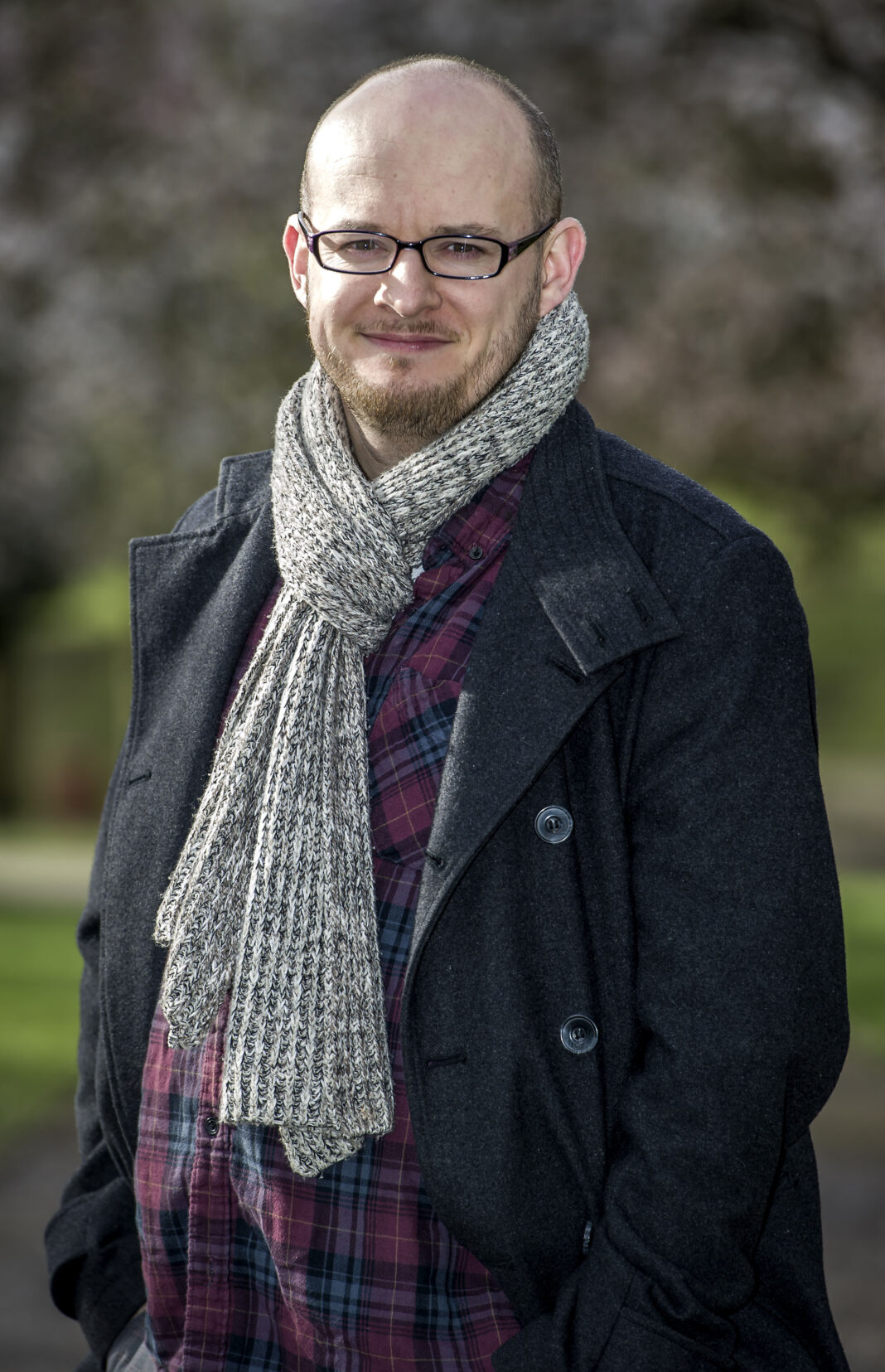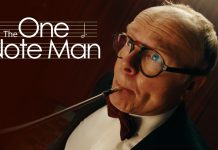The dynamic of a long-married couple is affected by the lockdown in a brand new short, THE MAN AT THE BOTTOM OF THE GARDEN.
Film And TV Now spoke with the maker of the film, Paul Blinkhorn, about the short film.
FILM AND TV NOW: The film represents the tension between a long-married couple and their respective perspectives. Were the characters based on anyone in particular?
PAUL BLINKHORN: Marji and Joe have been married for decades and like many people in lockdown they’re finding spending 24 hours a day in the same four walls a bit of a challenge.
There’s a fair bit of tension, but also a lot of love. The characters aren’t based on anyone is particular – though my wife has since said she could see us turning into Marji and Joe in 30 years. I’ll take that as a compliment.
FTVN: Tell us about your cast.
PB: We managed to secure a great cast with the short. We’ve Denise Black (CORONATION STREET, BAD GIRLS, QUEER AS FOLK and CUCUMBER) as Marji, Paul Bradley HOLBY CITY, EASTENDERS) as Joe and Clare Calbraith (VERA, DOWNTON ABBEY)as Jess.
They were all absolutely fantastic and worked together incredibly well. Despite us needing to shoot the entire film we still found plenty of time to have a laugh.
When you have actors as experienced as Denise, Paul and Clare it just makes the whole thing much easier. There was a real family feel to the whole thing – with the cast also doing all of their own costume, make-up, props, lighting and even the music. I’d work with them all again in a heartbeat.
FTVN: Tell us about your production team.
PB: The core production team was a pretty small one. I couldn’t have made THE MAN AT THE BOTTOM OF THE GARDEN without Producer Karen Newman, who I first met a couple of years ago at Bolton Film Festival as well as Casting Director Ben Cogan, who was a real asset when it came to getting the right cast in place.
Editing was done by Christopher Rubino with grading by Guy Pearson and sound mix by Paul Anderton. I also had some additional support from my 10-year-old son Oliver when it came to filming the exteriors and the inserts at home.
FTVN: Where did you shoot and for how long?
PB: The film was shot remotely over a single day, with all of the actors being recorded from home. I also did some additional filming for the exteriors at home with assistance of my 10-year-old son, Oliver. Everything was recorded over Zoom, which offered the actors to opportunity to play off each other as well as to rehearse.
FTVN: What cameras did you use for the production?
PB: We used the inbuilt cameras on the laptops/ Macs of the cast. The stills that were used in the film were taken on an old Fuji S4900 digital camera with the exterior footage being filmed on my Nokia 5 phone. We also supplied each of the cast with a Rode studio mic which could be connected to their device via a USB.
FTVN: Given that this is another Zoom-based short, where do you feel the technology will be best served in storytelling in the future?
PB: Remote recording and Zoom films have their challenges – one of the biggest being reliable and speedy internet access. The more people you have actively participating in a Zoom meeting the more chance that there is for issues.
There are work arounds and things that can be done to minimise the risk – I was recording from home so had everyone else turn off their devices for the day to ensure my internet speed was at its optimum.
I’ve become aware of several instances of productions filming remotely during Covid and its been great to see people adapt. Some of Zack Synder’s reshoots for The Justice League for example with Ezra Miller were filmed on the set of Fantastic Beasts 3 with Synder directing remotely.
With Zoom, which is far more accessible and cost effective for independent productions I think that there’s a lot of potential. I have experimented with shooting multi-camera, with more than one device being set up in one location and logged into the same session.
A director colleague in New York, Joshua William Gelb and choreographer Katie Rose McLaughlin have been creating some really interesting work in Theater in Quarantine using green screens and a closet.
I think the technology can take film-making and specifically independent film-making to some really interesting places. With the right project and the right team it’s possible to have multiple units working on the same film in different countries.
This opens the door to international collaborations for film-makers who might otherwise find this out of reach due to budgetary constraints. From a storytelling perspective it’s about seeing how far you can push things…and then pushing some more. There’s been some real advances in virtual production (THE MANDALORIAN and the most recent THE LION KING) using gaming technology which given the right steer and investment could take things to the next level.
At the minute people are messing around in Zoom with their background and filters, but we’re only at the beginning. Given time and the development of the right stories we could well find ourselves creating whole new worlds that can be recorded remotely and at a price point that film-makers without the backing of big studios can afford.
FTVN: We understand this was a selection in the BBC Writer’s Room. How important and significant is this as a springboard for writing talent?
PB: The BBC Writer’s Room is a huge springboards and resource for writers. It was as a result of them having the InterConnected callout during the first lock-down, which looked for short scripts that could be made remotely, that I was compelled me to write THE MAN AT THE BOTTOM OF THE GARDEN. None of the characters or the story existed before I read that brief. It was also a useful exercise to be writing to a specific brief.
The script made it to the longlist, getting down to the final 50 out of almost 7,000 submissions, with eight scripts ultimately going on to be produced by the BBC. In my case writing the script for BBC Writer’s Room opportunity ended up being the first step, rather than the destination. I was determined to turn a rejection to my advantage.
Not having the script produced by the BBC meant I could also direct the thing myself. And with the assistance of Producer Karen Newman that’s exactly what we did.
FTVN: Would you expand this short into a feature script?
PB: I don’t have any plans to expand the short into a feature, though I have found myself finding places for Jess, Marji and Joe to possible appear in another script I’m writing, which is another comedy. I certainly think that there’s room for these characters to return. Maybe I’ll create my own cinematic universe, like the MCU, but on a much smaller budget.
FTVN: What are the immediate plans for the short?
PB: The intention with the short is to get it into film festivals and in front of audiences. It’s been a very challenging year to create work, so to just get it out there and have it appreciated by audiences is all that we can ask for.
What issues and themes would you like to explore in your future work?
I’m generally drawn to darkly comic material as a writer and director, but I’m also a big fan of genre, particularly sci-fi, so I’m looking to explore a few things in that realm. I’ve a handful of short scripts I’d like to make before taking the step up to direct my first feature.
One of these is a short dark comedy which examines the debates around the right to die and assisted dying – which features a Muppet-like puppet in a leading role. It’s called THE END and has been developed with a film and television puppeteer friend and was runner-up The Pitch film competition 18-months ago.
I’m currently co-writing a political biopic as well as trying to make in roads into writing and directing for television.
FTVN: How has the global situation affected your development and evolution as a film-maker?
PB: The pandemic and the lock=downs have been something of a double-edged sword. I found much of my work as well as a number of development opportunities cancelled which was a big knock, but I’ve also found that some incredibly talented and individuals and companies have made themselves more accessible over this period.
One of the positives to come from this period is that there has been a plenty of opportunity for creative growth and reflection. There have been some fantastic sessions led by festivals and the likes of Screen Skills, BFI Network, Directors UK, BAFTA and the Writer’s Guild of Great Britain. They’ve helped to keep me sane.
Lock-down is also directly responsible for the co-writing partnership I’m now in, which came about as part of a Creative England and StoryFutures programme I did remotely. We’ve already been commissioned to write four episodes of a sci-fi web-series and have a short going into production later this year.
FTVN: Finally, what are you most proud of about this short?
PB: I think what I’m most proud of with this short is the fact that we managed to make something at all during lock-down. And it’s a comedy.
We had a few curveballs during post-production courtesy of Covid, which delayed the release, but we got there in the end. I’m incredibly pleased with what we created together and I couldn’t be happier with the performances that the cast delivered.





























